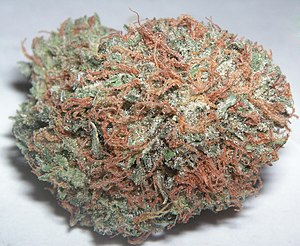 Image via Wikipedia
Image via WikipediaPRESS RELEASE to all media 20 October 1999
"Current Christian Heritage party rationale is inadvertently promoting harmful drug use", said Mr Kevin O'Connell, policy analyst and "catholic" cannabis reform candidate of Christchurch.
"People actually find it easier to be abstinent, when they are not being coerced" he said, in response to Christian Heritage criticisism of improved access to clean needles for the many in New Zealand who are injecting drug users.
"To close their hearts to the health & community precedents for drug normalisation and "harm reduction" forms part of a sociological determinant matrix, maximising drug uptake", says Mr O'Connell, who holds degrees in Computer Science & English.
"Through justice interventions, it sends a message that its OK to bully drugs users who haven't caused anyone any demonstrable offence, said Mr O'Connell. This hypocrisy really puts young people off seeing any good news in Christianity".
A law in disrepute represents moral "grey area" that the Churches must resolve, he said.
While Mr O'Connell's party does not directly hold a policy on heroin, Aotearoa Legalise Cannabis Party members do believe there are strong precedents for harm reduction, and that these are being ignored by anti-drug moralisers, to the detriment of our society, and collective spritual health.
"The controlled availability of the drug of choice in a health orientated environment has worked everywhere its been tried", said Kevin O'Connell. If legal environments have failed anywhere, its because of an absence of an credible education and health context, he said.
This is the case of alcohol use in NZ, and particularly double standards surrounding the nicotine uptake and binge drinking models, while the less problematic drug, marijuana, is criminalised. (Health Select Committee "Cannabis" Inquiry, p39)
Mr O'Connell quoted the evidence of addiction specialist Dr John Marks (Drug Policy Forum Trust), who has demonstrated that regulated markets produce minimised harm according a simple quadratic function (between extremes of total prohibition and unfettered supply (as presented by ALCP analysts to the Parliament's Social Policy select committee on the Tattoo parental consent bill, 5 September, 1999 - "dope 'n' tattoos"- and holistic harm prevention)
For opiate addicts, desperation is a big part of the problem, and leads to crime, unhealthy shooting arrangements, and recruitment of new users to raise the big money needed for an illicit habit.
Hepatitis C amongst the Injecting Drug Users in NZ is feared to be reaching up to 70% prevalence. (personal communication, Robert Kemp, Drug and Health Project, Wellington). "This is thanks to policies expoused by a group of people who say they are Christian, but are reluctant to get their heads around the fact that it is fundamentally unsound to define what might be a sin, as a crime", said Mr O'Connell.
In Switzerland, crime dropped 70%, overdose deaths plummetted, and social function returned when heroin was clinically supplied to junkies in the Needle park, under the "fellowship" principle.
"More addicts present for treatment, and more get off the stuff", said Mr O'Connell, who stressed again that while this was evidence, it was not incorporated into a multi-platform drug policy under the ALCP, because CANNABIS REFORM IS THE STEPPING STONE to truth, freedom and harm minimisation.
While opiates are a problem, cannabis use is far more extensive, and parallels that of tobacco in New Zealand, with over one in five having used marijuana in the past year, according to the Alcohol & Public Health Research Unit, Auckland University.
Specifically addressing the religious dilemma, Mr O'Connell, said that "The genesis story is subject to an allegation of heresy under the policy of the Christian Heritage Party, and they should consider a reconciliation with the cannabis lobby in the interests of good community relations."
"Just because decision makers have decided to make cannabis a criminal plant, doesn't make this arbitrary definition valid under the HIGHER law of Nature."
In banning the primary food source (hempseed) and the proverbial "tree of knowledge" they've thrown out the baby with the bathwater, on a global scale, and manufactured the perversion of prohibition.
"God givith seed bearing plants like cannabis and poppies, and for that matter, magic mushrooms (psylocybin)", said Mr O'Connell. Who are these people who can't seem to understand that partaking of forbidden fruit has been the way of the world since time immemorial.
"If cannabis is the gateway, then open the doors of perception, we're going in", he said. "And let's have a society where we are free NOT TO USE DRUGS."
Criminalisation is an impediment to intelligent Christianity. It's as unconscionable as saying we should "burn the books" added Mr Blair Anderson, who is running in Te Tai Tonga (Southern Maori) for non-sepratist unity.
"Poverty, discrimination, violence and alienation afflicts families and humanity, but we have the opportunity to start planting hemp and all will be forgiven."
"The Christian Heritage Party and all intenders in this election have our challenge to back off on cannabis", said Mr O'Connell, and Mr Anderson. - "We've got to get ourselves back to the garden, so let the healing of the unholy prohibition begin".
In terms of pre-election coalitions the Cannabis Party could favour leader Michael Appleby's idea that the ALCP join the Christian Heritage and form the CCCP.... "The Christian Cannabis Coalition Party".
==================30=====================
Kevin, Blair (03) 389-4065






